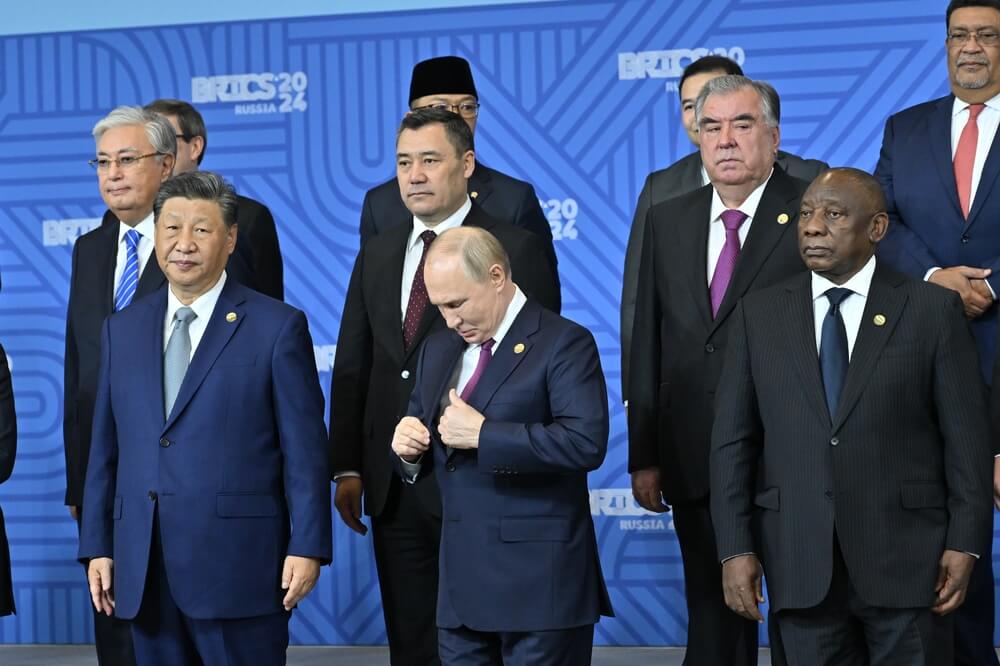It has been all too easy to pick holes in President Donald Trump’s agenda, not least his economic strategy, which is riddled with contradictions and more likely to make America poorer than “great again.”
And yet, when he recently suggested that the G7 ought to include Russia, and perhaps also China, I found myself nodding in agreement.
Following the creation of the euro, when France, Germany, and Italy committed themselves to a shared currency, a centralized monetary policy, and common fiscal-policy rules, it no longer made much sense for each to retain its position in such an elite global policymaking group.
And if you look beyond macroeconomics to the domains of diplomacy, security, public health, climate change, and so on, it made even less sense.
This was one of the core arguments of the 2001 paper in which I coined the BRIC (Brazil, Russia, India, China) acronym. It was already obvious at the time that as these countries rose, the eurozone’s share of global GDP would decline.
My goal was to raise awareness of what was coming, and to press the G7 to become more global and forward-looking. To remain relevant, it could not just represent aging, declining “industrialized” powers.
In fact, I went one step further than Trump, by suggesting that Brazil and India be included along with China and Russia. The resulting G9 would comprise the BRICs, plus Canada, a eurozone delegation, Japan, the United Kingdom, and the United States.
G11 would be a vast improvement over the current G7
Given how the world has evolved since 2001, I might revise this proposal to drop Canada and the UK (though neither would be too pleased by this).
Canada’s inclusion has always been questionable (if Canada, why not Australia?), and the UK now falls into the same bucket, at least in strictly economic terms. There is no good argument for why these countries should come before India.
While the Canadians and the British have a long history of upholding the rule of law and supporting allies like the US, these attributes are not what matters in global governance.
Trump has shown that he has little time for the grouping
In any case, even if Canada and the UK would never accept my proposed G9, a G11 would be a vast improvement over the current G7, which has no credible claim to global relevance.
This was already true in 2001, and now the overwhelmingly dominant G7 member would seem to agree. Trump has shown that he has little time for the grouping.
What is the G7 without the US?
But what is the G7 without the US? To be sure, one valid function is to provide a forum for like-minded democracies seeking common ground on specific issues. If the point is to dictate global solutions to others, however, it is a nonstarter.
Of course, if it was up to Trump, he would opt for a G3, with China, Russia, and the US carving the world into their own spheres of influence.
Trump could start laying the groundwork for a more enduring framework over the next few years
And though he will not hold the presidency indefinitely, he could start laying the groundwork for a more enduring framework over the next few years.
Whatever happens, the politics will remain complicated. India – which will be the third-largest economy by 2030, barring some major crisis – will not accept a position subservient to Russia or China, nor should it.
And despite Brazil’s persistently erratic economic policies, no one denies that it is Latin America’s leading power.
G20 does need to be more effective
At this point, many diplomats will interject to argue that the G20 represents the future of global governance. Since it already offers a place at the table for the BRICS (the original four, plus South Africa), what need is there for something more elite?
I was among those who celebrated the G20’s elevation as the premier international forum in 2008-10, when it proved highly effective in devising solutions to the global financial crisis.
 The BRICS and other emerging powers seem to have concluded that the G20 itself is driven by the G7
The BRICS and other emerging powers seem to have concluded that the G20 itself is driven by the G7
But over the last decade, it has increasingly lost its way – proving to be too large, too unwieldy, and too vulnerable to political pressures and controversies, whether they come from Russia, China, or the US.
Moreover, in recent years, the BRICS and other emerging powers seem to have concluded that the G20 itself is driven by the G7, with members of the latter group often imposing their own ideas or playing an outsize role in setting the agenda.
This perception has made it easier for Russia and the other BRICS to coalesce and oppose G7 initiatives. I witnessed this personally after the COVID-19 pandemic, when an effort to establish a G20 Health and Finance Board floundered.
This is not to suggest that the G20 should cease to exist. But it does need to be more effective, and the best way to do that is to update the G7 so that it is no longer a source of distrust and resentment.
Jim O’Neill is a former chairman of Goldman Sachs Asset Management and a former UK Treasury minister